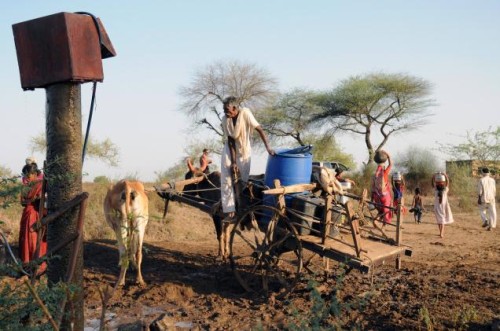He's a butcher out of business. "I want to shift to a town like Panderkauda," says Sarfaraz Qureshi in Yavatmal district. "I'm unable to sell any meat in the villages I work in." Qureshi is a small operator who carries as much meat as he can load on to his motorcycle to poor tribal villages on the forest edge. And there he sells at very low prices. "Yet my business has collapsed," he says. But why? Have people in those villages stopped consuming meat? Are they now unable to afford even his prices?
"These past months, they're eating more meat than ever before," says Qureshi. "Only, it's free. The forests are stone dry and the drought has seen many wild animals coming out these past months to the fields and farms in search of water - only to be trapped and eaten. So how can I sell any meat? I've made many trips and sold nothing." There is no aspect of life in Vidarbha that has not been impacted by the severe water scarcity.
Matter of life and death
In the village of Jaulkhed in Akola we meet a baby deer that strolled in with the goats returning from grazing. A sympathetic village has adopted the young creature, who seems at ease with his new world. Other wildlife has been less fortunate. Boar, deer and even peacocks coming out of the forest or woods for water have been eaten by hungry villagers. The desperate search for water is a matter of life and, literally, death.
One group talks to us while emptying such a well. "Look at this water," says one of them smiling, showing us a brownish liquid in his battered can. Meanwhile, some of Vidarbha's reservoirs are approaching or have arrived at dead storage levels. That is, at levels from which the water cannot be lifted or transported.
"In some of our villages," says Vasudev Ingle in Kinkhed in Akola district, "you can get water through the formal supply once in 10 or 12 days." Maya Ove of Dharel village, carrying three pots on her head, each atop the other, stops to agree. "This takes hours of our time every day." Even the livestock you see are searching for water. And wild animals are wandering into the farms or villages looking for it.
Vidarbha is not a very low rainfall region. Some of its districts get 900 mm or more a year on average. But the last two years have been bad. Rainfall has either been very deficient or highly erratic in timing and intensity. The drought of mid-2009 really took its toll on people from February and March this year. Had the 2009 crop not failed in the drought, the income from that would have come in fully in February and March. In single crop areas, which most of this region really is, crop failure means up to 24 months without income. Two successive failures could mean up to 34 months that way. A third is too awful to contemplate in a region already beset by crisis, farm suicides and man-made calamity.

Across rural Amravati, Akola, Washim and Yavatmal, almost every human being you see in the morning is collecting or searching for water.
"The water position is very serious," says Amravati Divisional Commissioner Dinesh Waghmere. Five of Vidarbha's six ?crisis' districts fall in this division which has had 3,465 of its villages declared as scarcity-hit. "Most reservoirs are running at levels of 8-10 per cent or even much less. In Yavatmal, there are some at dead storage level." At that stage, it serves only to keep the fish alive. In Pentakli in Buldhana district, for instance, the level is 0.98 per cent. In Arunavati in Yavatmal, it's at 3.21 per cent. In Bembla in the same district, it is almost dry.
Groundwater crisis
The groundwater crisis is no less acute. Over extraction, misuse and illegal "water mining" have combined with other factors to push the water table ever lower. In some talukas, says a geologist with the Groundwater Survey and Development Authority (GSDA), the depletion has been three metres in five years and eight since 2000. Lack of rain does not help an already poor recharge. Meteorological drought has combined with its hydrological counterpart to sharpen the problem. "For years, strengthening water sources and helping improve recharge - these vital things were never taken up in this region," says a senior official. "Now we're paying the price." And the effects of water-related projects under both Prime Minister's and Chief Minister's packages, if any, are invisible.
The heat is on, quite literally. Afternoon temperatures cross 45°C or worse. That 8 to 10 hour power cuts end up crossing 14 hours "unofficially", does little to improve tempers.
Administrators locally have stepped up the number of tankers carrying water to villagers. Yavatmal has over 200 functioning, Buldhana 61, Washim 55 and so on. The local administrations have also been requisitioning private wells for Rs.300 a day on average and supplying water from there to a desperate people. "Even those are running out," says one official. We can add more tankers, but where's the water?"
Some are counting the days to June 15 by which time they hope the rains arrive. Yavatmal Collector Sanjay Deshmukh is going to release water from what remains in a few days from now. "What's the point of holding on to it with people in such need of it?" he asks. "The amount there is, we will lose it anyway to evaporation. It's at such levels. Better people get to drink it than watch it dry up."
Meanwhile Qureshi, who has watched it dry up, is seeking renewal of his licence to operate in Panderkauda town. "I'm done with my old circuit," he says. "The villages are no
place to sell meat."























